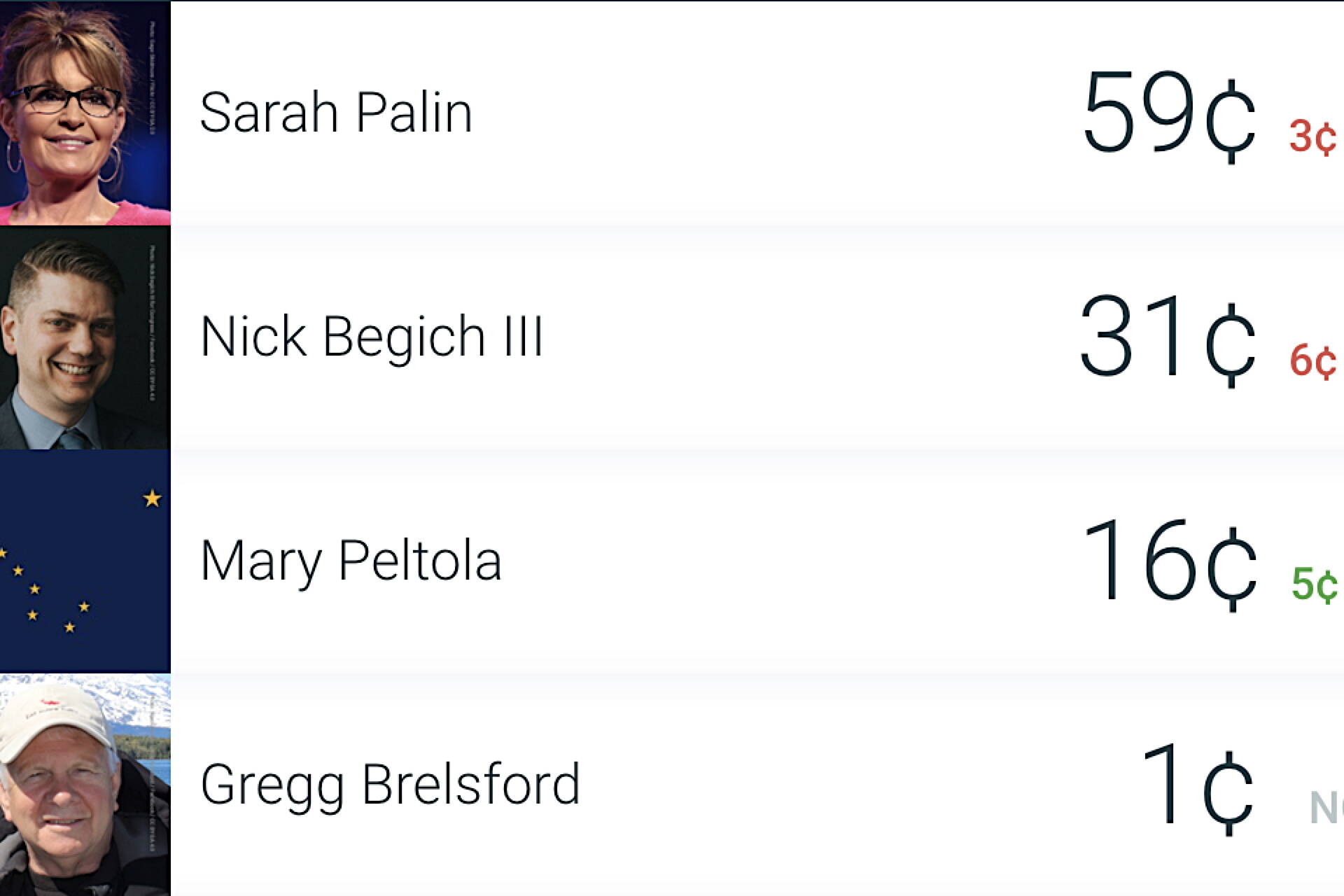Either very smart or very dumb money is riding on Sarah Palin being Alaska’s next congresswoman.
The former Republican governor is favored to win Tuesday’s special election by nearly 1-2 odds at the betting website BetOnline, with Republican rival Nick Begich III at nearly 2-1 and Democrat Mary Peltola at 7-1. That defies polling and analysts who say Palin is likely to lose under most probable scenarios in the state’s new ranked choice voting system, which Palin has been consistently attacking throughout her campaign.
BetOnline lists Palin at -190 odds, meaning a punter needs to bet $190 to win $100. Begich, generally favored by the “experts,” is listed at +190 (bet $100 to win $190). Peltola, who pundits say has at least a puncher’s chance, is listed at +700 (bet $100 to win $700).
“This is ass backwards,” said Ivan Moore, head of Alaska Survey Research, whose polling for the state’s races is generally cited by national pundit/prediction sites such as FiveThirtyEight. He said his polling suggests Begich has a 50% chance of winning, Peltola 35% and Palin 15%.
Moore’s odds are based on a simple premise: Peltola is certain to survive the first elimination round of ranked choice voting as the lone Democrat, while Begich and Palin have equal odds of prevailing in their competition for Republican votes. If Begich survives he is essentially 100% certain to defeat Peltola in the final elimination round, while Peltola has a 70% chance of winning a head-to-head match against Palin due to the latter’s 65% negative approval rating.
So why is Palin the favorite at BetOnline and other political betting websites?
“Because people are stupid, because they haven’t got the data and they haven’t thought through the fact she’s got two big hurdles to overcome,” Moore said. He said Palin’s name recognition and celebrity status are also likely factors in attracting betters, resulting in lower payoff odds.
BetOnline’s odds are somewhat less odd with the U.S. Senate race with Republican incumbent Lisa Murkowski listed at -300 to win reelection and +200 to be defeated. People betting on that race will have to wait until the November general election since all of her chief rivals are likely to advance under the final-four ranked choice system, but Moore said his current polling suggests the incumbent has an 80% to 90% chance of prevailing, which is higher than the betting odds suggest.
Murkowski’s strongest challenge is from fellow Republican Kelly Tshibaka, a Donald Trump-backed candidate who is a clear winner in head-to-head polls among Republican voters. But once Democratic and independent voters are added to Murkowski’s totals in the ranked choice elimination rounds she ends up the ultimate victor.
“Tshibaka is the kind of candidate where the better she’s known the less her chances are,” Moore said.
Moore’s assessment is essentially shared by FiveThirtyEight, whose model of simulating the election 40,000 times shows a 95% chance of a Republican winning and 86% chance of that Republican being Murkowski. It also predicts the Republican is likely to win by roughly a 20% margin and possibly as high as 50%, while the best-case scenario for a Democrat is a 10% margin.
The race for a full term in the U.S. House shows somewhat different odds than Moore’s, but in large part because the pundit site is forecasting the November election for a full two-year term, when a fourth candidate (presumed to be Republican Tara Sweeney) is almost certain to be on the ballot. The site’s simulation forecasts an 88% chance of a Republican winning the House seat, with Begich having the best odds among candidates at 48%.
In the governor’s race, a Republican has a 70% chance of winning and incumbent Mike Dunleavy has a 69% chance of being that winner. Democrat Les Gara is seen having a marginally better chance than independent Bill Walker if a Republican fails to win.
Coming up with an unusual — and at this point arguably dated — assessment of the race based on Moore’s numbers is Sabato’s Crystal Ball at the University of Virginia’s Center For Politics. It classifies Alaska’s Senate and House seats as “safe Republican,” and governor’s race as “likely Republican.” The House rating, published at the end of June after the primary for the special election, assumes Palin or Begich will win.
“While Alaska has gotten a bit more competitive in recent years, it’s still fundamentally a Republican state, and Palin and Begich finishing markedly ahead of the other candidates helps illustrate the state’s lean,” Sabato notes. “If you add up all the Republican votes and all the Democratic votes…Republicans outpolled Democrats almost 2-to-1 in the first round of voting.”
For people pondering the worth of financial vs. survey speculators, FiveThirtyEight gives Alaska Survey Research a grade of B/C, which is pretty much in the middle of the bell curve of all nationwide pollsters. But the site also notes it’s a “provincial grade” due to the relatively low number of surveys the Alaska firm conducts and the last assessment of predictions vs. results is from 2018.
• Contact reporter Mark Sabbatini at mark.sabbatini@juneauempire.com.

